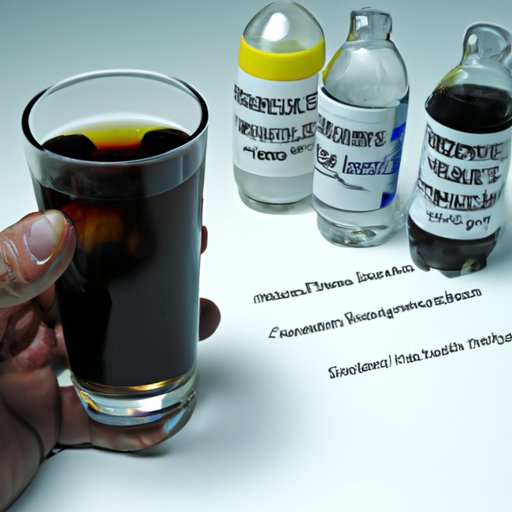Introduction
For many people, diet soda is an appealing option for those looking to reduce their sugar intake. However, there has been much debate about whether or not diet soda can cause diabetes. In this article, we will explore the potential link between diet soda consumption and diabetes risk.

Examining the Link Between Diet Soda Consumption and Diabetes Risk
Before we dive into the potential effects of diet soda on diabetes risk, it is important to understand what diabetes is. Diabetes is a chronic condition in which the body does not produce enough insulin, or does not use insulin properly, resulting in elevated blood sugar levels. People with diabetes must carefully monitor their blood sugar levels and often take medication to help regulate them.
It is thought that diet soda may increase the risk of developing diabetes by altering the body’s metabolism and increasing insulin resistance. Studies have also shown that people who drink diet soda are more likely to be overweight or obese, both of which are risk factors for type 2 diabetes.
A 2017 study published in the journal Diabetologia found that drinking one or more artificially sweetened beverages per day was associated with a higher risk of developing type 2 diabetes. The study followed 60,000 adults over 14 years and found that those who consumed one or more artificially sweetened drinks per day were 18% more likely to develop type 2 diabetes than those who did not consume any artificially sweetened drinks.
How Artificial Sweeteners in Diet Soda May Increase Diabetes Risk
Artificial sweeteners are synthetic sugar substitutes used in many diet sodas and other low-calorie food and beverage products. These sweeteners are significantly sweeter than sugar but contain few or no calories. There has been much debate about the safety of artificial sweeteners and their potential health risks.
One potential risk of artificial sweeteners is that they may alter the body’s metabolism and increase insulin resistance. This could result in increased blood sugar levels, which is a risk factor for diabetes. A 2018 study published in the journal Trends in Endocrinology & Metabolism found that artificial sweeteners may disrupt the body’s natural ability to regulate blood sugar levels, leading to an increased risk of diabetes.
Another potential risk of artificial sweeteners is that they may encourage unhealthy eating habits. A 2016 study published in the journal Appetite found that people who consume artificial sweeteners are more likely to eat larger amounts of unhealthy foods, such as processed snacks and sweets. Eating large amounts of unhealthy foods can lead to weight gain, which is another risk factor for type 2 diabetes.

Exploring the Potential Effects of Diet Soda on Blood Sugar Levels
In addition to the potential effects of artificial sweeteners, studies have also looked at how diet soda consumption may affect blood sugar levels. A 2015 study published in the journal Diabetes Care found that consuming diet soda was associated with an increased risk of developing prediabetes, a condition characterized by elevated blood sugar levels.
The study followed 4,000 adults over 10 years and found that those who drank one or more diet sodas per day were 43% more likely to develop prediabetes than those who did not drink any diet sodas. The study also found that those who drank two or more diet sodas per day were twice as likely to develop prediabetes.
Is Diet Soda a Contributing Factor to Diabetes Development?
Although research has demonstrated a correlation between diet soda consumption and diabetes risk, it is still unclear whether diet soda is a contributing factor to diabetes development. A 2019 study published in the journal BMC Medicine examined the link between diet soda intake and diabetes incidence. The study followed 7,000 adults over 20 years and found that those who consumed one or more diet sodas per day were more likely to develop type 2 diabetes than those who did not consume any diet sodas.
However, the study also found that those who consumed diet soda were also more likely to engage in other unhealthy behaviors, such as smoking and lack of physical activity. These behaviors are established risk factors for diabetes, which means that it is difficult to determine whether the increased risk of diabetes is due to diet soda consumption or other lifestyle factors.
Conclusion
In conclusion, there is evidence that suggests that diet soda consumption may increase the risk of developing diabetes. Studies have found that drinking diet soda is associated with an increased risk of type 2 diabetes and prediabetes, as well as elevated blood sugar levels. Additionally, artificial sweeteners in diet soda may alter the body’s metabolism and increase insulin resistance. However, it is difficult to determine whether diet soda is a contributing factor to diabetes development due to the potential confounding lifestyle factors.
Further research is needed to determine the exact relationship between diet soda consumption and diabetes risk. Until then, it is important to be mindful of your diet soda consumption and to follow healthy lifestyle habits to reduce your risk of diabetes.
(Note: Is this article not meeting your expectations? Do you have knowledge or insights to share? Unlock new opportunities and expand your reach by joining our authors team. Click Registration to join us and share your expertise with our readers.)
